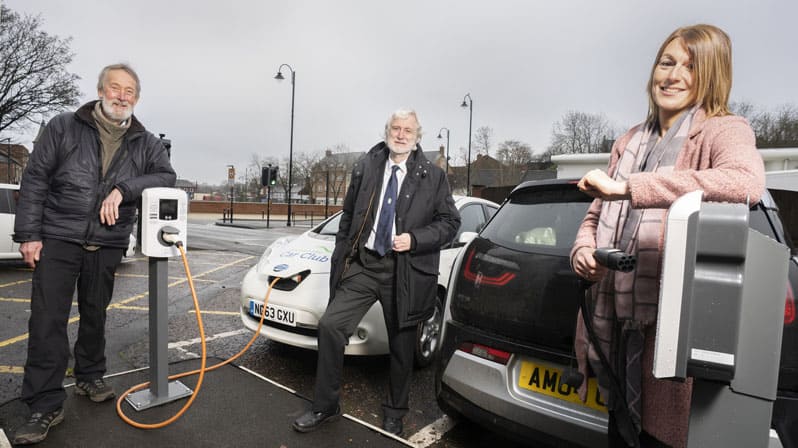Electric vehicle charging points will become more widespread across County Durham in a move to reduce carbon emissions and make it easier for residents to own electric cars.
As part of an ambitious plan to ensure residents without off-street parking can access an electric vehicle charge point within a five-minute walk from their home, Durham County Council will be installing around 100 electric vehicle charge points across the county within the next 15 months.
Currently focusing on the county’s rural areas, the first stage of the initiative is part of the On-street Residential Charge Point Scheme (ORCS) which has funded 60 7-22kwh electric vehicle charge points.
The charging points will be installed in council-owned car parks and each will be capable of charging two vehicles at once.
Last month, 37 charge points were installed in Chester-le-Street, Consett, Seaham and Stanley.
A further ten are set to be installed in Stanhope as a test area for engagement and convenience for electric vehicle users.
Another 50 charge points will then be delivered in areas across the county in close partnership with parish councils.
The ORCS funding builds on the Scaling On-Street Charging Infrastructure project (SOSCI). This project is delivering a further 100 charge points at locations requested by residents across the county in partnership with Innovate UK.
The SOSCI project aims to support the county’s residents who would like to switch to an electric vehicle but cannot due to having no access to off-street parking in which to charge it.
Promoting the take-up of electric vehicles will help reduce air pollution and CO2 emissions as well as allowing people to save money on fuel costs.
After declaring a climate emergency in 2019, Durham County Council pledged to reduce carbon emissions from its operations by 80 per cent by 2030, and to take necessary action to make County Durham carbon neutral by 2050.
To ensure this, the council developed its Climate Emergency Response Action Plan (CERP) outlining the measures it will take to meet this pledge, such as increasing the number of charge points to promote and make it more accessible to own an electric vehicle.
Cllr John Clare, Durham County Council’s climate change champion and an Aycliffe ward councillor, said: “We know many residents would like to make the switch to an electric vehicle but cannot due to the logistics of being able to charge their vehicle, particularly in rural areas, which is why we are working to make electric vehicle charge points more widespread across the county.
“Making the switch to an electric vehicle not only creates significant environmental benefits by reducing CO2 emissions but allows the owner of the vehicle to save money on fuel costs.
“As a council we have pledged to take action to reduce the county’s carbon emissions, and this initiative will help us in our goal by promoting and enabling the practical use of electric vehicles.”
For more information on proposed areas for electric vehicle charge points, or to suggest a location for the scheme, visit durhaminsight.info/SOSCI/.








